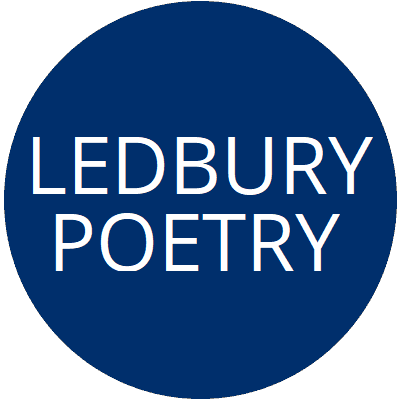Text by Sandeep Parmar.
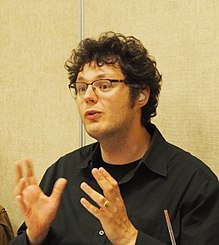
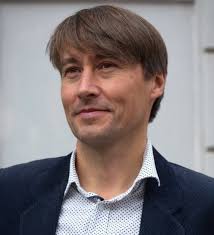
Aleš Šteger is a poet, prose writer and essayist, based in Ljubljana, Slovenia. His work has been widely translated into several languages including German, Czech, Croatian and Spanish and has found much acclaim among readers around the world. Šteger’s writing has appeared in internationally renowned magazines and newspapers as The New Yorker, TLS and many others. He is a recipient of the Veronika Prize for the best Slovenian poetry volume of the year, the Petrarch Prize for young European authors, and the Rozanceva Award for the best book of essays written in Slovenian. He is founding editor of the Beletrina publishing house and founded the Medana Days of Poetry and Wine festival. The translator of Šteger’s The Book of Things, the poet Brian Henry, writes that Šteger is one of Central Europe’s most essential literary figures. Others have noted that the ‘unimaginable wealth of meaning’, ‘insatiable curiosity’ and ‘penetrating force’ of his poetry, work that operates ‘on the sharp edge of the possible and the impossible’. Šteger’s latest collection, Above the Sky Beneath the Earth, is forthcoming from White Pine Press in October 2019. Ilya Kaminsky was born in the former Soviet Union but has lived in the United States since 1993. He is the author of two full-length poetry collections, the multiple prize-winning Dancing in Odessa, published in 2004, and the very recently published Deaf Republic from Faber and Faber. Already this latest collection is being praised by critics in both the US and the UK, and the book has been nominated for Best Collection in this year’s Forward Prizes. He is a translator from Russian of Marina Tsvetaeva and Polina Barskova and the co-editor of The Ecco Anthology of International Poetry with Susan Harris. He has received a Whiting Award, a Lannan Literary Fellowship, and a Guggenheim Fellowship, and was named a finalist for the Neustadt International Prize for Literature. His work has been translated into more than twenty languages. Ilya is not only a poet of substantial gifts but a tireless advocate, indeed like Šteger, for widening the readerships of poetry across the borders of nation and language. Later this year, Ilya will collaborate with the Ledbury Emerging Critics Scheme to launch a US version of the mentorship programme for BAME poetry reviewers. This will be based initially at Georgia Tech University where Ilya is a Professor and Director of their Poetry Centre. Writing about Deaf Republic in The Poetry Review, Ledbury Poetry Critic Dzifa Benson urges ‘if you were to read only one book of poetry in 2019, this should be it.’
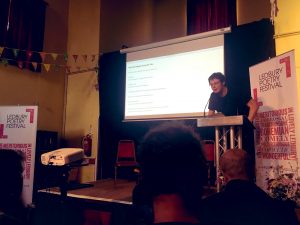
On July 7th Aleš and Ilya read at Ledbury Poetry Festival in the Burgage Hall to a room full up to the rafters. (Podcast here) Aleš read a range of new work, sometimes in Slovenian but mostly in English, modulating his voice between a whisper to the sureness of irony. His poems form image complexes that divine an idea from an assemblage of concrete objects or abstract ideas, turning occasionally to the metaphysical. He spoke of the Brechtian ‘dark times’ in which we find ourselves (again), where the poets themselves even deceive with their imaginations. The poem ‘Mountain’ meditates on the borders of language and nation from the landlocked country of Slovenia, standing at a high point where it is possible to see where your language ends, where it is no longer spoken. Expanding on W.B. Yeats’s line from ‘The Second Coming’, Aleš writes ‘things meet and also fall apart’. Later, Aleš’s ‘Syracuse’ collapses the ancient world with the horrors of the present. Here the vantage point is the temple of Athena in the Sicilian city which overlooks the Mediterranean and the cruel theatre of the refugee crisis. He joked about a conversation he and Ilya (and others) had the evening before, one which spilled into the pub: are there any good happy poems? What is a happy poem? Aleš then read a poem which he admitted was not happy but praising. It indeed sounded praising, but also full of longing. Where these two emotions meet is perhaps the wish to be worthy of happiness. (Ilya and I resolved at the pub the evening before that even though there are a handful of good happy poems, no happy poem had ever really changed our lives.) Ilya read second and focused entirely on his new ‘tale in verse’, Deaf Republic. I have seen Ilya read from this book in the United States (where it was earlier published by Graywolf) and also been in the room when he’s read from his previous book, Dancing in Odessa. Anyone who has seen Ilya read will remember it for a long time. His delivery is operatic, passionate; it is song that delivers tragedy, absurdism and love in as one might expect a prophet to lay out the future for a fearful people who hang on his every word. The dramatic sits in Ilya’s work (‘our country is a stage’, ‘Gunshot’) as an allegorical mechanism where a cast of characters (a whole city, but also a couple very much in love) drive the narrative towards its logical conclusion. A boy is shot dead by a kind of totalitarian regime in a fictitious town (it could be any town, it might become any town we live in soon). In protest, the whole population goes deaf. It isn’t that they can’t hear; it is that they refuse. Ilya closed his reading with ‘We Lived Happily During the War’—an articulation of suffering and joy that questions where the human individual exists within the nation and the stage of history. Never mentioned but on all our minds were, no doubt, these dark times of the political strongman, xenophobia, and intolerance. As Ilya repeats in his sequence ‘observe this moment, how it convulses’, thereby extending the possibility of the lyric to include collective subjectivities—character, reader, audience, poet, a vastness of humanity. The readings concluded just on the hour and so we had to forego our planned discussion. Ilya and Aleš have very kindly agreed to take a few questions via email, which follow. I am so grateful to them both for taking the time to do this for us and for their tremendous and memorable readings.
Q. Earlier in the day we heard from the Chinese poet Yu Yoyo, whose translations by AK Blakemore and Dave Haysom were published by the Poetry Translation Centre. In response to a question about politics, she asserted that she did not wish her work to be political and that to ignore politics is ‘to punish politics’. Indeed, it is to deny our complicity with the theatre (or circus) of politics. Seeing as both of your works sometimes directly address political issues I wonder what you both make of this in relation to your own writing and reading (across literary and linguistic traditions)?
Ilya Kaminsky: Thank you for this question—and, thank you, even more, for the context. I admit I always find myself bewildered when literati in Western Europe or North America set up the table at the conference and announce: “And Now We are Going to Hold a Panel on Political Poetry.” I find it almost funny. But, also kind of sad. Not because I don’t believe in political poetry; of course I do. What makes me sad is that people don’t seem to realize the inherent luxury we have here in USA or Western Europe to even divide poetry into “political” and “not political” – it is simply the kind of luxury people elsewhere in the world do not have.
Someone like Akhmatova or Césaire did not have such a luxury. But, lets forget about poetry super-stars: 99% of people in the world do not have such a luxury. That’s saying something about us in literary circles, doesn’t it?
So, it would be one thing if the Chinese poet said “I don’t believe in political poetry” – as many in US or Western Europe do in fact say. And, it is another thing for that poet to say “I want to “punish” politics. That is a political position, indeed; one of refusal. There are many such “I refuse” positions in literature (and on various subjects, not just poetry). One thinks of Sinyavsky, for instance, or of Nicanor Parra’s Anti-Poems.
One is also reminded of Brodsky’s position, who once said: I don’t write against Soviet regime. I write as if Soviet Regime simply doesn’t exist.
Aleš Steger: Whenever poets try deliberately to perform a political act with a poem they face a possibility of utter disaster. The politics of the poem has an agency itself, it does something to us, poets, not the other way around. Change is inevitable, on the level of poets’ consciousness, within the world and regarding the future process of writing. Radical alternative positions — when it comes to strategies of poetry and politics — arise from that point of the struggle between knowledge and hope, ideas and wonders, opinions and the acts of listening.
Gottfried Benn was playing with that idea of a double life, complete separation of inner and outer life. And he was doing that in the context of Nazi Germany. For me, his position presents a really interesting case to study and learn from.
Although the politics have radically changed since Benn’s times, many writers and artists still do not realise and acknowledge that applying predominantly cold war narratives and strategies to what contemporary political dynamics does not suffice. It may please some critics and the literary establishment, but that is about it. The political establishments we have today have mastered the games of ignorance. A big quest of every writer is probably to search for new ways and new languages to respond to the challenges of our times. To be heard.
A poet might indeed find him- or herself under severe pressure both from the political circumstances of the countries he or she comes from (and every country has it’s own political peculiarities and radical blind spots) and by the pressure created by some imaginary western and leftist ideologies which, it seems to me, often demand a delivery of plain political messages, reactions, and pamphlets from a poet or a writer. A poet’s proactive political stance towards his/her country or the world is often seen as an “entrance ticket” to the international poetry scene. On the other hand, we all know so many promising authors who literally destroyed their poetic gifts by boiling down their writings to propaganda. Everyone, surely, has a right to express oneself. But it is a different question whether an expression of political stance is also poetically interesting and productive. Sometimes it is. Many times it is not.
Q. Varieties of humour appear in both of your work—I think this is usually either absurdist or ironic humour, a function of language play. Since we discussed (possibly impossible) happy poems, what possibilities does humour offer you?
Ilya: Actually, I hope there is humour and laughter in my poems that isn’t just absurdist or ironic. I would hope for actual sincerity of tone. I think irony is important when one is Zbigniew Herbert or Wislawa Szymborska in Poland writing ironic poetry because if they wrote direct verse they would get in trouble with authorities. It is completely different thing for middle class writers in a capitalist society to play with irony and to avoid various ranges of emotion.
As for what humour offers—it puts one in touch with one’s self, with fellow humans. Who and what are we without laughter?
Aleš: Humour travels hardest, it is sometimes impossible to be translated, especially when it comes to socially deeply embedded forms of black humour which imply a deep knowledge of social and political contexts and the different kinds of thinking and reasoning that derives from it. My novel Absolution is full of it, but it is rather a Central European type of humour and my experience with the reception of the novel in the UK is that the humour gets lost with translation. Translators should not be blamed for that.
Q. Aleš, your novel Absolution and Ilya your collection Deaf Republic both feature dramatis personae and similarly perhaps draw on the theatrical into albeit different (hybrid) genres. I know many of our most valuable works take much notice of generic forms (or their rules) but how do you think the dramatic situation works within lyricism (or even long sequences that verge on the epic)?
Ilya: I think the beauty of the hybrid as a genre is that every time one writes a hybrid piece one basically invents a new genre all together. Every single hybrid piece, if it is really a hybrid, produces something entirely new.
Why do it? To my mind, it is the kind of form that is used best when one has impossible questions, when one has emotions or ideas that one can’t quite articulate, when one can’t find previous models for such articulation. Hybrid form is an embodiment of the search for articulation.
For me, in Deaf Republic, theatrics were very much a part of this hybridity. My first book, Dancing in Odessa, was published in 2004. I was a new Soviet immigrant at that time, having arrived in USA in 1993. And, yet, I wasn’t fully Soviet anymore. I have lived in America for 9 years. So, the question I had to ask myself was: who am I? If I wrote another kind of book like Dancing in Odessa, with its echoes and conversations with Russian poets of the past—I would just be playing “the Russian.” But that is not who I was anymore, after 9 years as a refugee. What might be the form for the refugee? What might be the story that speaks to both USSR or Ukraine, where I am from, and the USA where I now live. That question needed an answer that developed its own form. I found that having the blend of lyricism and dramatic elements of theatre was useful. Why? It allowed the book to stay honest (thus the lyric poems) and also to create a fable/theatrics that could cover more than one life. As, alas, refugees are people with a divided life. But every problem is an opportunity, yes?
Aleš: Both Ilya and I love to play with the boundaries of poetry. Repetition is death for every kind of art. An attempt to reinvent and revitalise ones writing over and over again, is important. This can be done in various ways. The process of reinvention can certainly be demanding, but it is also one of the greatest gifts and pleasures of writing. One of my favourite books of poems, Lorca’s The Poet in New York, is a blend of this theatrical and poetical gesture you were talking about, too. Like Deaf Republic it opens a set of completely new possibilities with the structure of repetitions, narrative strings and transformative metaphors that work not only within an individual poem but also on the level of the book as a whole. In this respect, the borders between prose and poetry can be completely blurred. Think of José Lezama Lima’s Paradiso, a work that is usually labelled as a novel, but could also be read as pure poetry.
The initial question from which Absolution arises is what theatre is in its core. Part of the novel is actually set inside of a theatre. I clearly remember a February evening in 2012, when I was standing in the front of the National theatre of Maribor, a city in Slovenia. I saw people appearing almost out of nowhere, stepping out of the thick fog on their way to a theatre premiere. It was a purely poetic moment. I wanted to describe it. I had no clue what kind of text would arise from that scene but I knew that it represented a birth of something for me.
Q. I’d like to ask you both about your readerships (real or intended). You’re both hugely international writers, readers, editors, etc. But you also come from very specific linguistic contexts that are distinct from the usual English-language readership that all too rarely ventures into works by translated authors. Aleš, do you see your work addressing a readership in Slovenian very differently from your Anglophone reader? Likewise, Ilya, you’re a native Russian speaker who has spent most of his life in the United States. Where do you situate your reader? Is this important and if so (or if not), why?
Ilya: I think the answer to this question lies in the vocabulary. The word you will find most urgent in my poems is “human” – I am not much of nature poet, I am not good at writing about gardening, I do not write about many other things. What I focus us is that impossible question: what does it mean to be human? I ask it because no matter what my background, Russian, Ukrainian, Jewish, American, one of displaced person, etc., this question is still relevant, this vocabulary is still relevant. The work relies heavily on devices such as metaphors for instance, why? Because they can provide answers to impossible questions. The answer is there yet not. You don’t quite see it, and yet it is told. That is, perhaps, how a displaced person views the world. But in our time (or, frankly, at any time) a majority of people on the planet are displaced persons in one way or another. We come from the past that is known as nomadic; displacement is in our essence; that restlessness we call human. So, who in that case is the audience? No one? Or everyone? It depends on the day, of course.
But, at the end of that day, any poet will tell you that they are a private person, that questions they ask are very private questions. And, the poems only become relevant, if they are (beautiful enough, spellbinding enough to be) able to speak privately to many people at the same time.
Aleš: As teenager my first truly profound formative reading was the reading of translated poetry. I was reading poets and poems not originally written in Slovenian language. Without reflecting upon it, I have instinctively chosen a different lineage in writing. My first poetic fathers and mothers were coming from many unknown languages and cultures. I see it as a kind of radical and essential linguistic and cultural experience. My intuition told me that I have more in common with poets who lived and worked in totally different times, circumstances and languages as, say, with someone writing in Slovenian and living in Ljubljana now days. The wish to overcome one’s language, its margins and its traditions, the inner longing for expansion and transformation, for me this is the very core of a poet’s identity. This longing creates a thick net of references, possibilities and impossibilities, a inclination towards writing and living, the existential angle as Paul Celan calls it. Writing about one’s hometown? Why not. But only because one knows that there is never only one single hometown and that we are, as humans, at home approximately nowhere.
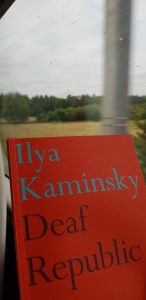
@shehzar doja: I’m on my train back from @ledburyfest and cant seem to get @ilya_poet‘s poems and performances out of my head. I am still shook. One of the true poetry greats of our time.”
Further reading: Clare Armitstead profiles Ilya Kaminsky https://www.theguardian.com/books/2019/jul/19/ilya-kaminsky-interview
